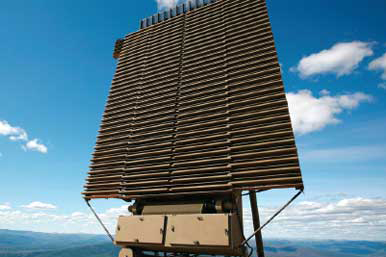But now BWE managing director Henning Dettmer is confident a solution can be found before the end of the year. His optimism is based on the results of an expert report on the impact of turbines on radar that was commissioned on the initiative of the Schleswig-Holstein energy transition ministry.
Dettmer said the study "makes it very clear that the DFS evaluation methods ... are questionable". The authors of the report advise all applicants to appeal any decisions against their plans on the basis of radar issues, he continued, adding that it's time the federal transport ministry came up with a solution based on scientific findings.
The DFS turned down 95 wind turbines in thewindy state of Schleswig-Holstein in 2013 alone, claiming its radar would be impaired, which prompted the state government to take action. Its state permitting authority commissioned an expert study to throw light on to the DFS claims and tactics.
In 2009 the International Civil Aviation Organisation extended the recommended protecting radius around radar sites from 3 to 15 kilometres, the Schleswig-Holstein energy transition ministry said. Yet the measurements of the actual interference caused by individual wind turbines within the 15 kilometre radius of the VHF Omni-directional radio range equipment facility at Michaelsdorf showed that beyond a radius of 3 kilometres there wasn't any, it pointed out.
The study was carried out by experts at the Technical University of Berlin, incorporating measurement work by FCS Flight Calibration Services. It also found the DFS calculations methods did not correspond with reality, nor was there a reliable simulation and calculation method for determining directional errors, and the forecasting model could not be validated. On top of that, the ministry commented in June 2014 that some radar equipment facilities are simply not needed any more, made redundant by changes in flight control. The study was made available to DFS and is subject to international scrutiny, it added.
Weather stations
But still new problems are emerging. The German weather service has taken the city of Emden to court for authorising installation of a wind turbine on the Knock coastal region where it operates a radar facility for weather forecasting.
The Emden-owned water drainage and disposal enterprise Entwässerungsverband Emden (E-Verband Emden) has been working on the permitting procedure for an Enercon 2.3MW turbine with 64-metre hub height since 2006. The turbine is to provide locally-sourced power for the four pumps at its Knock pumping facility and reduce the costs to local landowners, amounting to EUR 100,000-200,000 a year. But on 3rd July 2014, E-Verband Emden said although the turbine is now permitted, the project is on hold until the legal problems have been solved.
The company had commissioned an expert report on the potential impairment of the weather radar which concluded that the sum of all interferences at Knock is already so great that the additional contribution of the turbine is "acceptable". The city of Emden planning authority granted the construction and operation permit for the turbine on 28 February.
The Verband had commissioned an expert report on the potential impairment of the weather radar performance if its planned turbine were installed. The report concluded that the sum of all interferences already affecting the radar at Knock is so great that the additional contribution of the turbine is "acceptable".

.png)



.png)









